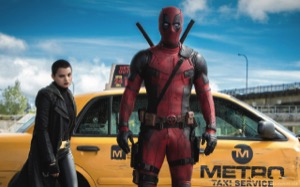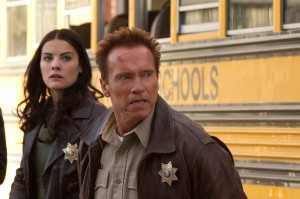A superhero story like no other
Originally published inLGBT Weekly

Ryan Reynolds and Brianna Hildebrand in Deadpool
One of the problems with the takeover of popular culture by Marvel and DC superheroes is how seriously the stories take themselves, how easy the morality is and how family-friendly everything is. Monster-budget films like The Avengers and the upcoming Batman vs Superman, or network dramas like The Flash and Agents of SHIELD, aim to reach the broadest audience possible, which means no swearing, little irony and barely a hint of sex. (The Netflix shows Daredevil and Jessica Jones are the exception, as they are niche shows.) Then there’s Deadpool, the raunchy, hyper and hilariously violent, anti-hero’s tale that exploded a dozen box office records last week. Based on one of the edgiest characters in the Marvel X-Men universe, the film both panders to the basest sensibilities of the young men who make up the lion’s share of comic book fans and mercilessly mocks superhero story conventions.
The film begins with the wise-cracking, red-hooded super soldier laying waste to heavily armed bad guys on a highway overpass. The first two acts use this sequence to set up flashbacks explaining how Deadpool got to this moment. A few years before, Wade Wilson (Ryan Reynolds), a very handsome and freakishly competent mercenary, goes around shooting and socking random jerks, for or not for payment. He has a truer moral compass than he claims, repeatedly saying he’s not a hero. One day, he meets a similarly witty and confident regular at his local bar for ne’er-do-wells, a prostitute named Vanessa (Morena Baccarin). A few minutes after they get engaged, he discovers he has advanced cancer (a weird tone shift for the film that until then is pretty light, even in its violence).
Shortly thereafter, a mysterious man in a suit (Hugh Scott) tells Wade his organization can cure and make him superhuman. At first Wade refuses, but then, out of guilt for possibly leaving Vanessa alone, he agrees and sneaks off in the middle of night. It turns out that this organization actually creates mutant slaves for especially evil criminals, and its chief scientist Ajax (Ed Skrein), a sociopath without the ability to feel pain, delights in torturing his patients. Ajax says it’s the only way to activate their latent powers. Eventually, Wade’s powers are activated, and he escapes. But while these powers give him the ability to heal from anything – he can even grow back an amputated hand – they rather horribly disfigure his skin and face: “Whatever they did to me made me totally indestructible… and completely unf@#*able.” Thinking that Vanessa will never want to see him again, Wade dons the moniker Deadpool and lays waste to the underworld looking for Ajax in order to force him to fix what he’s done.
Throughout the film, Wade makes filthy, twisted and obscure jokes; they happen so quickly and so often, I’m looking forward to the DVD so I can catch them all. Very few of them are printable, and I wouldn’t want to ruin the fun of you hearing them fresh. Wade also repeatedly breaks the fourth wall, commenting on the film’s plot directly to the audience, who no one else in the film understands is watching. This works better in the comics, where no characters in the Marvel Universe do this, but it still sets up good jokes and brings the audience into the action. Reynolds, who is an exceptionally winning and charismatic comedian, is as perfectly cast as Deadpool as anyone has been cast as a superhero (more so than Patrick Stewart as Professor X). After being at the center of one of the worst superhero bombs (Green Lantern), Deadpool redeems Reynolds as major star who can carry a franchise.
The other, less visible, winner is Tim Miller, the first-time director who presided over Reynold’s epic performance and Rhett Reese and Paul Wernick’s witty, giddy script.
Deadpool
Directed by Tim Miller
Written by Rhett Reese and Paul Wernick
Starring Ryan Reynolds, Morena Baccarin, Ed Skrein
Rated R
Powered by WPeMatico

